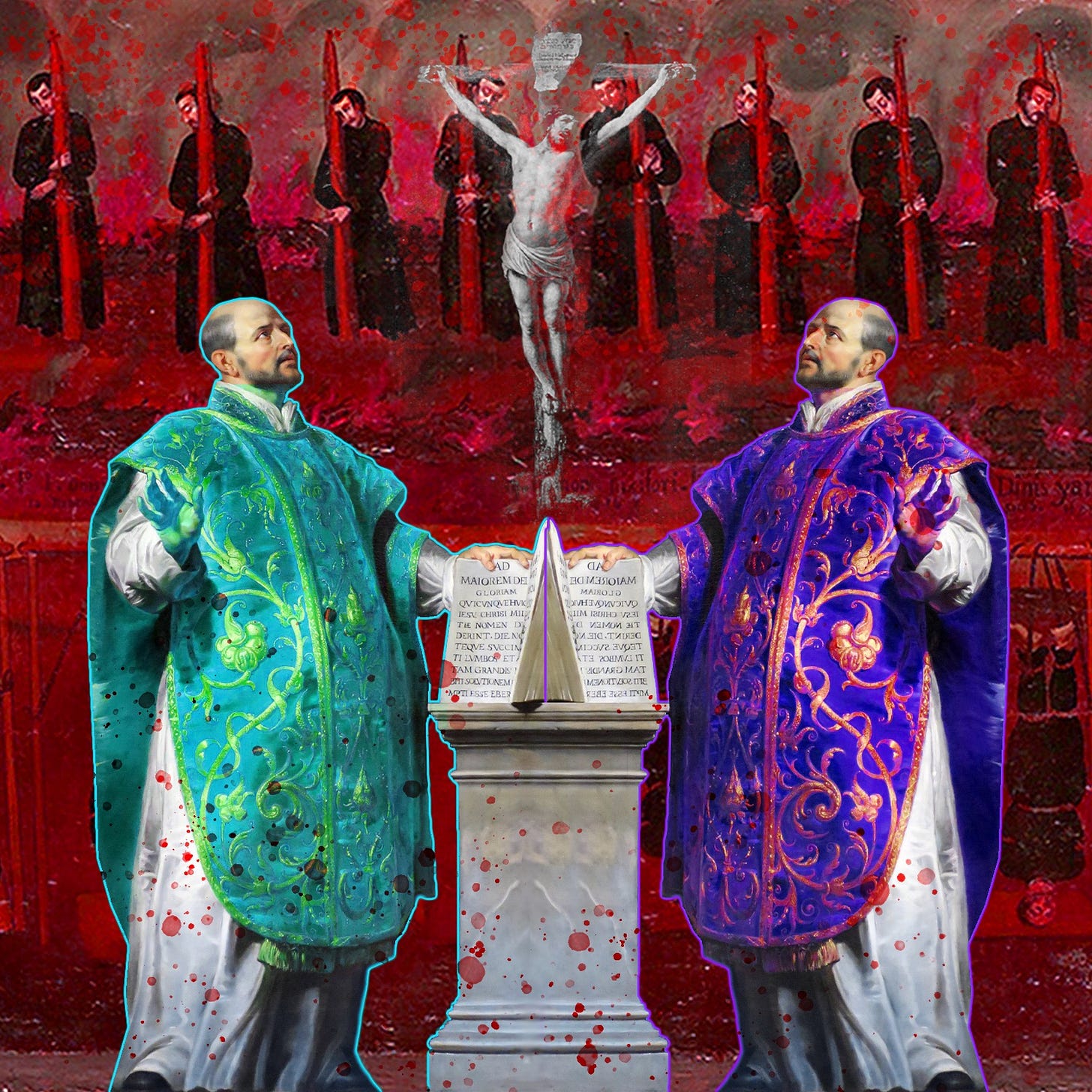Contrary to popular opinion, based Jesuits do indeed exist. Some of you reading this may object and ask: “Did a Jesuit write this?” Yes, a Jesuit did, but I can only attest for the based ones. Though I must admit, I am still recovering from my cringe era (I hope). And as all things Jesuit go, our brand of being based resists convention and thus is hard to pin down: thus I’ll attempt to paint a picture using examples (without getting too jesuitical about it).
Fr. Paul Mankowski, SJ, who died in September 2020, was an exemplar of basedness. He criticized progressive Catholic parishes in the U.S. for not making space for working class men: “Let’s call a spade a spade: the project of ‘Pastoral Inclusiveness’ is designed to repulse all but the enlightened elite. One prefers, after all, to celebrate diversity among one’s own.” He touches on a real issue: can churches claim to be welcoming to all if they alienate blue collar men?
On the other end of church debates, Fr. Bill McCormick, SJ, questions the project of Catholic Integralism. This movement rejects the modern separation of church and state in politics, with the subordination of the temporal to the spiritual. Fr. McCormick argues that this leads to a deformed Christianity: “When the sense of this distinction is lost, then Christianity tends to degenerate into civil religion, or the instrumentalization of the faith for political purposes. And as Christianity fades, that ‘faith’ can take on many forms.” Fr. McCormick’s critiques stem from his reading of Thomas Aquinas’ De Regno, which serves as a rebuke against rad trads who weaponize the Angelic Doctor against any idea that appears to be modern.
The based crowd within the Society of Jesus defies the theological and sociopolitical constructs of the day. Cracks in Pomo defines “based” as defying moral or artistic conventions from a place of apathy and ironic detachment. Based Jesuits, in contrast, resist through a depth of intellectual and spiritual maturity founded on the truth revealed by Jesus Christ.
This counteracts religiosity that serves both cringe ideological agendas (the “we need Vatican III” hysterics and the “radtrad sedacavantist” types) and so-called “based” #ironypilled performativity (which renders itself de facto cringe). The cringe crowd dissects and selectively uses parts of the faith, whereas the based one accepts its fullness in continuity and integrity. The only agenda is faith in Jesus Christ–rooted in ressourcement and aggiornamento–which offers the richness of the Catholic Church to the world.
My personal hero, Fr. Joseph Koterski, SJ, was the most based Jesuit I ever met. He taught philosophy at Fordham University, was editor of the journal International Philosophical Quarterly, was the chaplain for a dormitory, and was (likely) the spiritual director for most of the Missionaries of Charity and Sisters of Life in NYC. Many of us Scholastics wondered how he did all of these things, assuming the only explanation was that he could bilocate. Unafraid to preach about the Natural Law and defend the unborn in a university setting, he had the most serene presence when entering into any sort of difficult conversation.
I’ve sought to emulate his spiritual depth, patience, and generosity (with daily, abject failure). You knew he was a different kind of person when you met him; he seemed to be in touch with a larger world that extended beyond the horizon of what many of us could see. He passed away while giving a retreat in the summer of 2021.
Examples abound of based Jesuits sharing the fullness of the Catholic faith. Fr. Robert Spitzer, SJ and his Magis Center work to confront the supposed contradiction of science and faith. Fr. Bill Watson, SJ and the Sacred Story Institute shares Ignatian spirituality: “Aware of a dilution of doctrine that has crept into Catholic and Ignatian practices, Fr. Watson has built all SSI programming based on orthodox Catholic and Ignatian theology and spirituality.” Looking for the Enneagram? This is Catholic spirituality–for such cringe fare, try the New Age place down the digital road. Fr. Robert McTeigue, SJ confronts cultural issues through a Catholic lens on his radio show, The Catholic Current. There’s also Fr. Joe Fessio, SJ, founder of Ignatius Press, who studied under professors Ratzinger and De Lubac. Even if Fessio had not started Ignatius Press, he can be considered based by association.
These are just a few of the many based Jesuits that exist. However, many based members of our Society tend to have an unsensationalized, if any, media presence. So often, their lives are known solely to the people they serve and by reputation IRL. The based avoid digital spaces where people yearn to misinterpret and argue (as I write for this virtual corner that spurs debate and pretension). They are more preoccupied about the salvation of souls than “owning the libs” or clamoring to be “culturally relevant.” Based Jesuits have better things to do with their time than chase vibes.
An aspect of cringeness is being “overly earnest” or ostentatious about one’s moral or political views. This can devolve to having a personal brand to sell, performing for a crowd, and/or seeing the world as a reflection of the self. (The Tates and Musks of the world are outstanding exhibits of this). In Ratzinger’s own words: “Speaking just to find applause or to tell people what they want to hear…is like prostitution…Don’t look for applause, but look to obey the truth.”
Obedience to truth is worth more than obedience to one’s ego. As Adubato writes: “...basedness requires humility and a form of self-abnegation–I must reach a point when I realize that I’m not the source of meaning in the universe and that my sincerity will not, in fact, solve the world’s problems.” Living in truth requires humility and self-abnegation–values which St. Ignatius of Loyola, founder of the Society, wanted Jesuits to live out.
Ignatius describes three kinds of humility in the Spiritual Exercises. The third kind is the highest: the desire to imitate Christ in poverty and insults, and to be considered a fool for Christ’s sake. The preoccupation with one’s own image or perception by others through earnestness is a real distraction. In contrast, a fool for Christ holds his life in ironic detachment. This is not done in a nihilistic sense, but in the realization that the self does not create meaning: meaning is given by God.
Ignatius had a sense of ironic detachment towards his life. When serving plague victims in Paris, he felt a pain in his hand and thought that he had contracted the plague. The thought horrified him, and in an attempt to get over his fear, he thrust his hand in his mouth: “If you have plague in your hand, then get it in your mouth also.” The fear for his life paralyzed him and hindered him from following Christ. Ignatius sought to conquer it so that he could be free to serve, even if that meant losing his life.
Humility and self-abnegation are revealed as ways to the truth through Christ’s unconditional kenosis, his self-emptying. The self can’t get in the way if the self is being emptied. This makes the self transparent to witnessing to the truth. Based Jesuits live mortified lives in order to help others grow in love for God.
Henri De Lubac, SJ lived this self-emptying, based spirituality. One of the most influential theologians of the 20th century, he suffered much in his lifetime. He was censored by the Society for being too progressive. But, in a twist of grace, he was invited by Pope John XXIII to serve at Vatican II. There, he became friends with Karol Wojtyła, who would become Pope John Paul II. After Vatican II, he was marginalized by the Society in France for being “behind the times.” Von Balthasar describes the situation:
“However, the one-sided development of the Society of Jesus in France – which was dominated by a small group of progressivists whose only Church Fathers had the names Marx, Freud, and especially Nietzsche – pushed the old master into the corner again... Although he is highly esteemed by many laypeople and priests, those who set the tone of the order consider him hopelessly outdated. And since he has found much to criticize in the theory and practice of post conciliar episcopal conferences, he is also not well liked in circles of the hierarchy.”
De Lubac was not afraid to call a “spade a spade:” he criticized everyone (some Thomists still have it out for him). Despite all of this, John Paul II made him a cardinal in 1983. French bishops recently opened a cause for his canonization. De Lubac is one example in a based tradition, extending from the beginning of the Society to today. Pope Francis, the first Jesuit pope, constantly gives based takes (despite the media around the world that tries to control his image). He likens the use of abortion to avoid birth defects to the Nazi attempt to purify the German gene pool.
Fortune may favor the cringe, but the based will inherit the earth. The Jesuits are here to preach the truth in all political and theological seasons. The based tradition continues today, as the Society attracts those who are looking for something deeper than the surface level spiritual gimcrack that is found in society today (described by the previous Father General, Adolfo Nicholas, SJ, as the globalization of superficiality). Those who love Jesus and feel called to make his love known in a sick world through spiritual and intellectual depth ought to consider joining the Society.
Fr. Aric Serrano, SJ is a newly ordained Catholic priest. He’s a member of the Jesuit U.S. Central and Southern Province and currently lives in Punta Gorda, Belize where he is associate pastor at St. Peter Claver Parish.
Check out Fr. Aric’s appearance on the pod.
Please consider signing up for a paid subscription to this page for more riveting content. If you’re new to Cracks in Pomo, check out the About page or read up on our Essentials. Also check out our podcast on Spotify, Apple, and YouTube and follow us on Instagram and Twitter.
MASA tortilla chips by Ancient Crunch is offering our followers 10% off their order with the promo code CRACKSINPOSTMODERNITY. Click here to redeem.
graphic made by @wafers3d





There should be a term for this type of lay person as well
I would like to see a cause for beatification opened for Fr. Koterski.